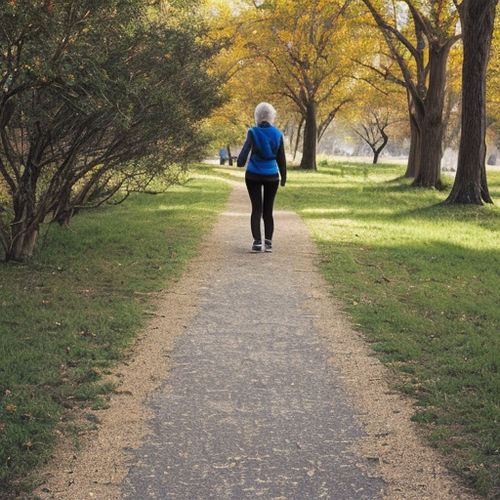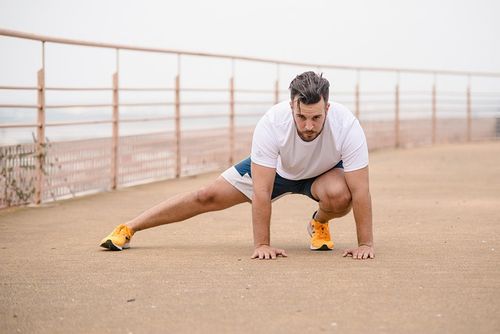In a world filled with high-intensity workouts, complex fitness regimens, and expensive gym memberships, one of the most underrated yet powerful forms of exercise remains simple: **walking**. Often overlooked as "just a basic activity," walking offers profound health benefits that can transform physical, mental, and emotional well-being. Unlike extreme workouts that may lead to burnout or injury, walking is sustainable, accessible, and adaptable for all ages and fitness levels. This article explores why incorporating regular walking into your daily routine is one of the best decisions you can make for long-term health.
The Science Behind Walking: Why It Works
Walking is a low-impact, aerobic exercise that engages multiple muscle groups while improving cardiovascular efficiency. Unlike running or weightlifting, it places minimal stress on joints, making it ideal for people with arthritis, obesity, or mobility limitations. Research consistently shows that walking for just **30 minutes a day** can lead to significant health improvements, including:
- Reduced risk of chronic diseases (heart disease, diabetes, stroke)
- Improved mental health (lower stress, anxiety, and depression)
- Enhanced longevity (linked to a longer lifespan)
- Better weight management (boosts metabolism and fat burning)
Because it requires no special equipment or training, walking is one of the most practical and effective ways to maintain health throughout life.
1. Cardiovascular Health: Strengthening the Heart
One of the most well-documented benefits of walking is its positive impact on heart health. Studies show that regular walking:
- Lowers blood pressure by improving circulation and reducing arterial stiffness.
- Reduces LDL ("bad") cholesterol while increasing HDL ("good") cholesterol.
- Decreases the risk of heart disease and stroke by up to 30% when done consistently.
A landmark study published in the *Journal of the American Heart Association* found that people who walked briskly for **30 minutes a day, five times a week**, had a **20% lower risk of cardiovascular events** compared to sedentary individuals.
2. Weight Management and Metabolism Boost
Unlike extreme diets or strenuous workouts, walking provides a **sustainable** way to manage weight. While it burns fewer calories than running, it is easier to maintain long-term, leading to steady fat loss. Key benefits include:
- Increased calorie burn (a 30-minute brisk walk can burn 150-200 calories).
- Improved insulin sensitivity, reducing the risk of type 2 diabetes.
- Reduction in visceral fat (dangerous belly fat linked to metabolic diseases).
Additionally, walking after meals has been shown to **lower blood sugar spikes**, making it particularly beneficial for those with prediabetes or insulin resistance.
3. Mental Health and Cognitive Benefits
Physical activity is strongly linked to brain health, and walking is no exception. Research highlights that walking:
- Reduces stress and anxiety by lowering cortisol levels.
- Boosts endorphins, natural mood enhancers that combat depression.
- Enhances creativity and problem-solving—many great thinkers, from Aristotle to Steve Jobs, used walking as a tool for brainstorming.
A study from Stanford University found that walking increased creative thinking by 60% compared to sitting. Furthermore, regular walking has been associated with a lower risk of dementia and Alzheimer’s disease by improving blood flow to the brain.
4. Joint and Bone Health: A Natural Protector
Contrary to the myth that walking wears down joints, evidence shows it **strengthens them**. Benefits include:
- Lubrication of joints through movement, reducing stiffness and arthritis pain.
- Increased bone density, preventing osteoporosis.
- Improved balance and coordination, decreasing fall risk in older adults.
Unlike high-impact exercises, walking provides these benefits **without excessive strain**, making it ideal for long-term joint preservation.
5. Longevity: Adding Years to Your Life
Perhaps the most compelling reason to walk daily is its association with **a longer lifespan**. A study in the *British Journal of Sports Medicine* found that:
- Walking at a moderate pace for just 30 minutes a day was linked to a **20% lower risk of early death**.
- Brisk walkers had even greater longevity benefits, comparable to runners.
This suggests that intensity matters, but consistency is key—even a daily stroll can significantly extend life expectancy.
How to Make Walking a Lifelong Habit
To maximize benefits, consider these practical tips:
1. Start Small – Begin with 10-15 minute walks and gradually increase duration.
2. Incorporate Walking into Daily Life – Take the stairs, walk during phone calls, or park farther away.
3. Use a Pedometer or Fitness Tracker – Aim for **7,000-10,000 steps per day** for optimal health.
4. Walk in Nature – Forest walks ("shinrin-yoku" or forest bathing) enhance mental well-being.
5. Find a Walking Buddy – Social interaction increases motivation and enjoyment.
Walking—The Ultimate Health Hack
Walking is more than just a way to get from one place to another; it is a **powerful, evidence-backed health intervention** that improves cardiovascular fitness, mental clarity, joint health, and longevity. Unlike extreme fitness trends that fade, walking remains a timeless, accessible, and scientifically proven method to enhance well-being.
The best part? **It’s free, requires no special skills, and can be done anywhere.** Whether you’re young or old, fit or just starting your health journey, walking is a simple yet transformative habit that pays lifelong dividends. So put on your shoes, step outside, and start walking your way to a healthier future—**one step at a time.**

By Samuel Cooper/Apr 16, 2025

By James Moore/Apr 16, 2025

By Sophia Lewis/Apr 16, 2025

By Michael Brown/Apr 16, 2025

By Christopher Harris/Apr 16, 2025

By Natalie Campbell/Apr 16, 2025

By George Bailey/Apr 16, 2025

By Thomas Roberts/Apr 16, 2025

By Natalie Campbell/Apr 16, 2025

By John Smith/Apr 16, 2025

By Emma Thompson/Apr 15, 2025

By Lily Simpson/Apr 15, 2025

By Noah Bell/Apr 15, 2025

By Victoria Gonzalez/Apr 15, 2025

By Benjamin Evans/Apr 15, 2025

By Joshua Howard/Apr 15, 2025

By Daniel Scott/Apr 15, 2025

By Amanda Phillips/Apr 15, 2025

By James Moore/Apr 15, 2025

By Grace Cox/Apr 15, 2025